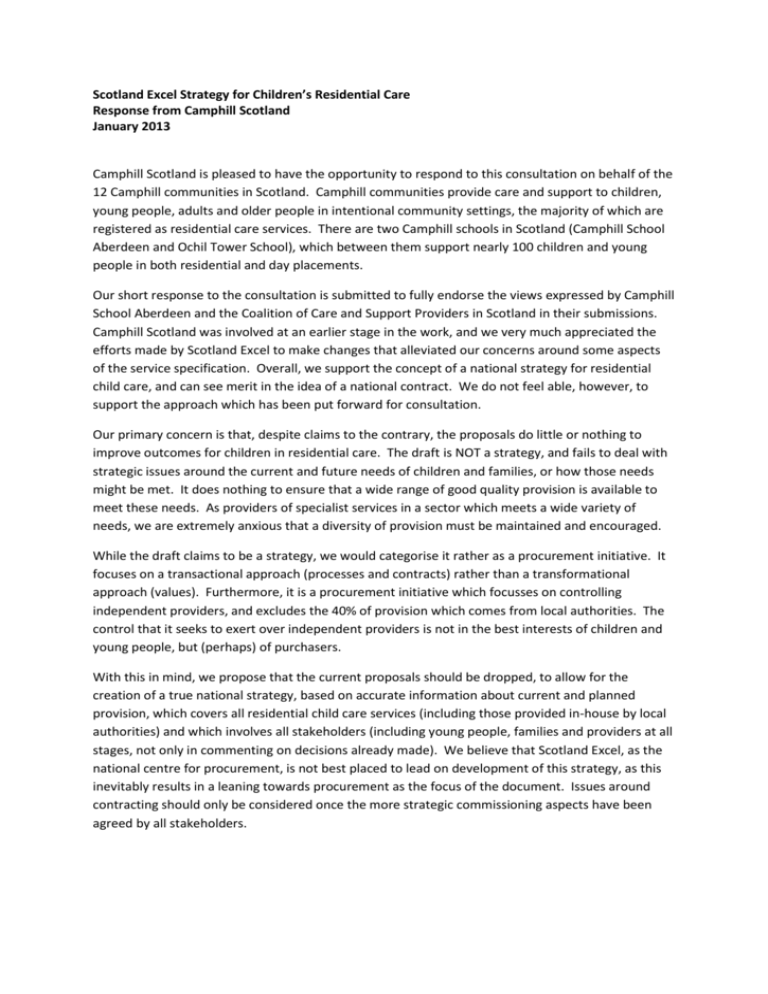Residential Child Care Strategy
advertisement

Scotland Excel Strategy for Children’s Residential Care Response from Camphill Scotland January 2013 Camphill Scotland is pleased to have the opportunity to respond to this consultation on behalf of the 12 Camphill communities in Scotland. Camphill communities provide care and support to children, young people, adults and older people in intentional community settings, the majority of which are registered as residential care services. There are two Camphill schools in Scotland (Camphill School Aberdeen and Ochil Tower School), which between them support nearly 100 children and young people in both residential and day placements. Our short response to the consultation is submitted to fully endorse the views expressed by Camphill School Aberdeen and the Coalition of Care and Support Providers in Scotland in their submissions. Camphill Scotland was involved at an earlier stage in the work, and we very much appreciated the efforts made by Scotland Excel to make changes that alleviated our concerns around some aspects of the service specification. Overall, we support the concept of a national strategy for residential child care, and can see merit in the idea of a national contract. We do not feel able, however, to support the approach which has been put forward for consultation. Our primary concern is that, despite claims to the contrary, the proposals do little or nothing to improve outcomes for children in residential care. The draft is NOT a strategy, and fails to deal with strategic issues around the current and future needs of children and families, or how those needs might be met. It does nothing to ensure that a wide range of good quality provision is available to meet these needs. As providers of specialist services in a sector which meets a wide variety of needs, we are extremely anxious that a diversity of provision must be maintained and encouraged. While the draft claims to be a strategy, we would categorise it rather as a procurement initiative. It focuses on a transactional approach (processes and contracts) rather than a transformational approach (values). Furthermore, it is a procurement initiative which focusses on controlling independent providers, and excludes the 40% of provision which comes from local authorities. The control that it seeks to exert over independent providers is not in the best interests of children and young people, but (perhaps) of purchasers. With this in mind, we propose that the current proposals should be dropped, to allow for the creation of a true national strategy, based on accurate information about current and planned provision, which covers all residential child care services (including those provided in-house by local authorities) and which involves all stakeholders (including young people, families and providers at all stages, not only in commenting on decisions already made). We believe that Scotland Excel, as the national centre for procurement, is not best placed to lead on development of this strategy, as this inevitably results in a leaning towards procurement as the focus of the document. Issues around contracting should only be considered once the more strategic commissioning aspects have been agreed by all stakeholders. We are pleased also to offer the following more detailed comments on some aspects of the consultation: Lack of appropriate consultation We are concerned that the views represented in the consultation document reflect the negative perceptions of local authority staff. We are disappointed to hear that provider involvement has been limited to commenting on drafts created by Scotland Excel with local authorities, and even more saddened that children and families have not been adequately involved in the process of developing the framework. As detailed above, we would like to see a truly inclusive process used to create a truly strategic national commissioning strategy. Exclusion of local authority services The exclusion of local authority in-house services from the document underlines the fact that this cannot be a national strategy for residential child care. It also undermines the usefulness of attempts to gather national data on standards or costs. More importantly, however, it is inequitable for children and young people in receipt of services: why should those whose support is provided by independent providers receive services which are subject to a different regulatory regime than those whose services are provided in-house by the local authority? Attempts to control independent providers We are concerned that the focus on rules and restrictions which are to be placed on providers gives a very real impression of mistrust – providers are portrayed as a group from whom purchasers have to protect themselves, and not in any way as partners in this process. The document reads as an attempt to control providers, in the interests of purchasers, not children. The responsibilities within the contract are very one-sided. There is no mention of redress for families if failure is on the part of purchasers, rather than providers. It is important to remember that contracts are agreements between two parties, not a means of one exerting undue control over the other. Providers are, quite rightly, concerned about the implications of signing such a heavily weighted contract, not least voluntary sector providers who are concerned about the impact that handing over so much financial control might have on their charitable status. We would like to see a collaborative, rather than a contractual, approach. Issues around reporting One of the things which attracted us to the idea of a national contract is that this might go some way to streamlining the variety of reporting requirements which Camphill schools are currently facing from a range of local authorities. It is unfortunate, therefore, that the option for local authorities to opt out of the national contract mean this benefit is unlikely to be realised. In addition, we are deeply concerned that the contract will in fact increase providers’ reporting requirements, rather than decrease them. We note that much of the information which is asked for is already provided to the Care Inspectorate and/or Education Scotland, and are disappointed at the lack of trust which purchasers are therefore showing in these bodies’ inspection regimes. Instead of duplicating efforts, we would like to see purchasers and providers working together to influence the forthcoming review of the National Care Standards and the Care Inspectorate’s inspection methodology, to ensure that a regime is developed which everyone feels happy with and can put their faith in. Duplication of reporting is time consuming and costly, which is ultimately not in the best interests of children and young people, from whom time and financial resources are being diverted. In addition, the information being requested does little to evidence the quality of care that children in residential care would like to see. We are also concerned to note that the security of information is not yet ensured, and have serious concerns about confidentiality and sensitive information in this regard. We would be pleased to participate in any further work around this topic. Please direct any queries to Neil Henery, Facilitator, Camphill Scotland neil@camphillscotland.org.uk.









